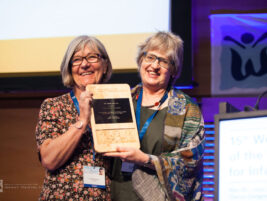Dr. Daniel N. Stern died in Geneva, Switzerland on November 12, 2012. He leaves his wife, Nadia, who collaborated with him on much of his research, his two sons, Michael and Adrien; three daughters, Maria, Kaia and Alice Stern; a sister, Ronnie Chalif; and 12 grandchildren. To them we extend our deepest sympathy.
Everyone who knew Dan will remember his brilliance, his charm and his commitment to the field. We here at the Brazelton Institute, remember him for personal warmth and quick humor, as well as for his originality as a theorist, and his brilliance as researcher, clinician, mentor, speaker and writer. We knew all along that he was one of the great minds of our time. On hearing the news, Berry Brazelton paid tribute to Dan by saying that “he was a thoughtful, lovely person. I learned so much from him and we shared so much together. I miss him very much”.

Daniel N. Stern was born in Manhattan in New York City. He came to Harvard as an undergraduate and then attended Albert Einstein Medical College, where he completed his M.D. in 1960. He conducted psycho-pharmacology research at the National Institutes of Health in Bethesda, Md., before he completed his residency in psychiatry at the –Columbia University College of Physicians and Surgeons. He later trained at the Center for Psychoanalytic Training and Research at Columbia. During his illustrious career, he was Professeur Honoraire in the Faculty of Psychology at the University of Geneva, Adjunct Professor of Psychiatry at Weill Cornell Medical College, and Lecturer at the Columbia University Center for Psychoanalytic Training and Research.
Dan Stern transformed the field of developmental psychology, by creating a bridge between psychoanalysis and empirically based developmental models. Because he believed that clinical practice needed to be based on scientific research, he dedicated his time to the observation of infants and to clinical reconstruction of early experiences. As a result, his ideas have changed the way that we think about babies and the parent-child relationship, about the transition to parenthood and the development of mental life.
There is an easy coherence between his ideas and our research efforts here at the Brazelton Institute. He integrated Berry Brazelton’s understanding of the infant’s contribution to the emerging parent-infant relationship, when he wrote that the infant’s behavior could be a powerful “port of entry” into the parent-child system.
Dr. Stern is the author of seven books, most of which have been translated into different languages:
- The Interpersonal World of the Infant: A view from psychoanalysis and developmental psychology, (Basic Books, 1985)
- The Interpersonal World of the Infant: A view from psychoanalysis and developmental psychology, (Basic Books, 1985)
- Diary of a Baby, (Basic Books, 1992)
- The Motherhood Constellation: a unifying view of parent-infant psychotherapies. (Basic Books, 1995)
- The Birth of a Mother, (written with Nadia Bruschweiler-Stern, Basic Books, 1997)
- The Present Moment in Psychotherapy and Everyday Life, (2003), W.W. Norton.
- In 2010, Forms of Vitality: Exploring Dynamic Experience in Psychology, the Arts, Psychotherapy, and Development, which used new understandings of neuroscience to explain human empathy, was published by Oxford University Press. In this, his final book, he draws on work from neuroscience, psychotherapy, and arts to explore creativity and the creative arts
He is also the author of several hundred journal articles in journals such as the Infant Mental Health Journal, the International Journal of Psychoanalysis and the Journal of American Academy of Child Psychiatry. He also wrote many book chapters, the latest of which was “A new Look at Parent-Infant Interaction” in Nurturing Children and Families: Building on the Legacy of T. Berry Brazelton, edited by Barry M. Lester and Joshua D. Sparrow and published by Wiley in 2010.
While Dan Stern’s ideas were complex, his writing was always accessible. His writing style was energetic and buoyant, the buoyancy generated by his sensitivity to cadence and tone and his awareness of the poetry of language. Even “The Interpersonal World of the Infant,” and “the Motherhood Constellation”, arguably his two most theoretical books, are both characterized by a poetic lyrical prose style, especially when he presents his observations of mother-infant interactions. “The Diary of a Baby” is a work of self-delighted inventiveness, as he tries to imagine the inner world of the young child. “The Birth of a Mother: how the Motherhood Experience Changes You Forever”, which was written along with his wife, Nadia, is also a book that retains its conceptual richness and at the same time is a book that is accessible to any expectant mother or father.
The words of the 16th century English writer, Robert Whittinton, describing Sir Thomas More, can be applied to Dan:
He is a man of an angel’s wit and singular learning; I know not his fellow. For where is the man of that gentleness, lowliness, and affability? And as time requireth a man of marvellous mirth and pastimes; and sometimes as of sad gravity: a man for all seasons.
Daniel Stern was, indeed, a man for all seasons. Now more than ever, we realize how privileged we are to have known him as a colleague and friend. We will miss him, but his ideas will live on in our thoughts and in our work.
A Tribute to Daniel Stern – Mentor, Colleague and Friend
Authors
Nugent, Kevin J.,
Director,
The Brazelton Institute,
Boston Children’s Hospital and Harvard Medical School,
United States






